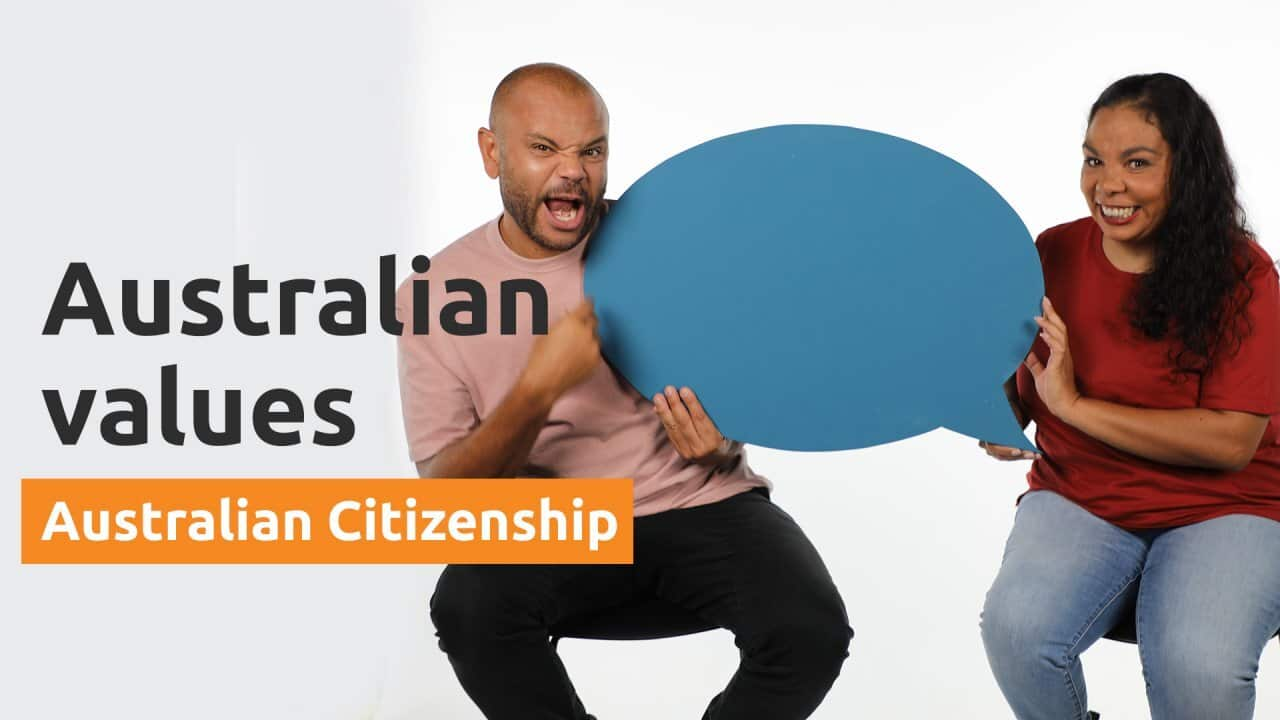Passing the Australian citizenship test is one of the most important milestones in our migrant journey, and you have to take the test in English. Join Luke and Angeline as they explain the key words and ideas you need to know.
This episode focuses on Part 3 of the booklet, Government and the law in Australia.
Watch more videos

Australian citizenship | Australia and its people | Part 1
Transcript
(Note: This is not a word-for-word transcript)
Luke
In Our Common Bond booklet, part three is about the government and Australia's law.
Angeline
He’s Luke, and I’m Angeline. We’ll help you answer questions from the citizenship test about how laws are made and how you, as a citizen, have a say on how Australia is governed.
Luke
In this country, we have compulsory voting. That means that all citizens who are aged eighteen or over MUST vote in federal, state and territory elections and in a referendum.
Angeline
For example, one question could be, 'Is voting in Australian elections compulsory?'.
Luke
Of course the answer is yes. Voting in elections is done by secret ballot. In this method, each person makes their choice privately, or secretly, so that no one else knows how they voted.
Angeline
So, this way, voting is free and safe. What does it take to change the Australian Constitution through a referendum?
Luke
For a referendum to be successful, we must have a double majority. This is when at least four out of the six states and more than 50 per cent of citizens give a YES vote.
Angeline
How many arms of government does Australia have? We are not talking about arms, as in hands.
Luke
No, arms of government are branches or types of government. These are different levels of power that control the government.
Angeline
Under the Australian Constitution, there are three arms of government.
Luke
There is the legislative power which makes laws.
Angeline
Executive power which carries out laws.
Luke
And the judicial power which applies laws.
Angeline
What do we call a proposal to make a law in parliament?
Luke
If a member of parliament proposes to introduce a new law or change an existing one, this proposal is called a ‘Bill’.
Angeline
What do we call the key decision-making body of government?
Luke
The Cabinet. That’s a committee of senior ministers who are responsible for different areas of government. Each area is called a portfolio.
Angeline
Which arm of government has the power to interpret and apply laws?
Luke
Judicial power is given to courts. The High Court is the highest court in the Australian judicial system. A magistrate is a judge who works in a lower court.
Angeline
They make decisions on legal matters, and if a person has broken the law, they decide what penalties they should have.
Luke
A penalty is a punishment that people are given when for breaking the law.
Angeline
Is it illegal to bribe a police officer?
Luke
A bribe is money or something else of value that is offered to someone because you want them to do something, usually something illegal.
So yes, it is illegal to try to bribe a police officer, because they are trying to make sure we all obey the law and so they should be fair.
Angeline
Is it against the law to use a hand-held mobile phone while you’re driving?
Luke
Yes, it is. You should also know that traffic laws are controlled by state and territory governments.
Angeline
Remember, there are three levels of government.
Luke
Australian government, state and territory governments, and local governments.
Angeline
These are all responsible for different services. I’m sure you’ll have a question about it in your test.
Luke
You’ll do fine. It’s all explained in part three of Our Common booklet.
Angeline
It’s available in forty languages. Let’s practise!
Luke
And don’t worry if you don’t get all the answers right – we haven’t talked about everything in the booklet, and you can look up any answers you don’t know in the booklet if you have to. This is only a practice, after all!
Angeline
Which of these is the role of the Governor-General?
- A) The appointment of the state premiers
- B) Signing all Bills passed by the Australian Parliament into law
- C) The appointment of the Head of State
The correct answer is B. The role of the Governor-General includes signing all Bills passed by the Australian Parliament into law.
Luke
Which arm of government has the power to make laws?
- A) Legislative power
- B) Executive power
- C) Judicial power
The correct answer is A. Legislative power is the power to make and change laws.
Angeline
Who is responsible for building permits and social planning?
- A) The Australian Government
- B) State and territory governments
- C) Local governments
The correct answer is C. Local governments are responsible for building permits and social planning.
Luke
What do we call a proposal to make a law in parliament?
- A) A vote
- B) Bill
- C) Ballot
The correct answer is B. The proposal to make a law, or change an existing one, is called a ’Bill’.
Luke
How did you go? Remember, you can always watch this video again if you want to review anything we’ve talked about. Then, when you’re ready, watch our next video. It’s all about Australian values. C’mon, let's finish strong together!
for previews, updates and to provide feedback.



